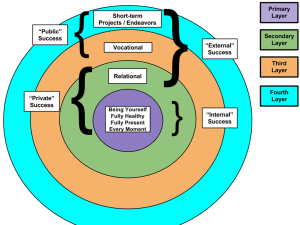The Success Onion
Summary
What is my definition of success? I have found that success comes in several layers, each layer relying on the previous layer to provide foundational strength and support. Success that is not built upon a strong foundation of inner layers is no real success at all. Like the house built on the sand, success built upon a weak foundation will crumble when the storms of life come – and they will come.
Layers
What is my definition of success? I want to be a good husband, good father. I want to be successful in business. I want to be influential in the lives of people – people close to me and far from me. I want to lift people out of poverty. I want to be filled with God’s Spirit and reflect his character and love. I want to be physically healthy. I want to climb Mt Rainier. I want to Mountain Bike in Europe. I want to be competitive playing sports for fun with my kids. My definition of success is deep and wide. It cannot be answered in one simple sentence.
- Primary Layer of Success – Be Yourself
What is my definition of success? I believe my primary calling is to be fully me. All of my unique DNA, if removed from each cell, uncoiled and stretched end-to-end, would be 80 billion miles long. I was created as a unique masterpiece. There has never been, and will never be another person like me.
I need to be fully me in every moment of my life to achieve authentic success. This requires holistic health. I need to be spiritually health. I need strong character. I need to be physically, mentally and emotionally healthy. The extent of my holistic health will determine the extent of my full presence in every moment of life. This is the base, deepest foundational layer of success upon which all other layers are built.
- Secondary Layer of Success – Relational
What is my definition of success? How often have we heard people bemoan that their quest for vocational success came at the expense of the people that mattered most to them: spouse, children, close friends, etc.? True vocational success has to be built upon a foundation of relational success. The Steve Jobs Movie is a great illustration of how terrible it can be if vocational success trumps relational success.
I want to build deep and satisfying relationships with my wife, my kids, my close friends, business partners, ministry partners, etc. A strong foundation here will enable me to achieve authentic vocational success.
- Third Layer of Success – Vocational
What is my definition of success? I want to invest my life in substantial causes that matter. I want to being my God-given talents and gifts to bear in a vocational endeavor that gets me out of bed early every morning. I want to be rewarded financially from my vocational success. I would like my vocational success to provide a platform of wide influence for me.
I understand in order to succeed authentically at this level, my private life needs to be strong – relationally and inwardly. If my vocational success is built upon a shallow, sandy foundation, it will crumble, and my vocational legacy will be reduced at best, or at worst – be completely destroyed.
- Fourth Layer of Success – Projects / Endeavors
What is my definition of success? I want to climb Mt Rainier. I want to be physically fit when I’m 80. I want to Mountain Bike through Europe. I want to build a nice stone patio in my backyard. I want to finish Birkie cross country ski race. I want to snowboard out West. I want to learn how to fly a plane. I want to write meaningful blog posts regularly. I would like to write a script for a movie. I want to write a book.
I have smaller, what I would call project level endeavors and goals. I may have one or more of these things going at the same time – in parallel with my vocation, relationship and personal leadership successes. These things provide the spice of life to me – extra incentives.
My Definition of Success
What is my definition of success? My definition of success cannot be fully articulated in a short sentence. It is tall, deep and wide. It is layered – multi-faceted, holistic and complete. It is internal and external, private and public. It is vocational and relational. It is about inner health and fun/exciting projects and endeavors. It is all of these things. When I put too much focus on one layer – one aspect – of success, I risk becoming unsuccessful across the board.
If pushed for a one sentence definition of success, I would have to say,
To be fully, completely and holistically ME, in every moment of my life.
But that is just scratching the surface of what my definition of success entails…









